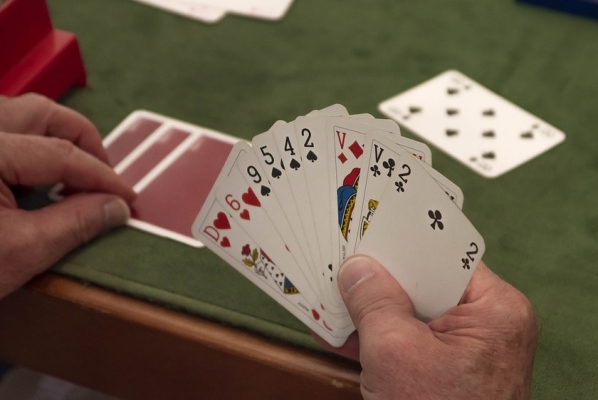Restricting Opponents Tricks in a Given Suit - Bridge 210
Image source: jackmac34 / Pixabay
I ended my last article, ESRA Magazine 209, with the question to readers as to how my partner, sitting in the South seat, brought home a somewhat ambitious small slam in Clubs on the following hand:
North ♠ A 7 6 4 | |||
♥ 5 4 | |||
West | ♦ A Q 5 | East | |
♠ Q J 10 5 3 | ♣ Q 8 7 6 | ♠ 9 8 2 | |
♥ K J 10 8 3 | ♥ K 9 7 2 | ||
♦ J 8 6 | South | ♦ 9 2 | |
♣ - | ♠ K | ♣ K J 9 2 | |
♥ A 6 | |||
♦ K 10 4 3 2 ♣ A 10 5 4 3 | |||
My partner, sitting South, had opened the bidding with 1♦. West intervened with a Michaels Cuebid of 2♦, showing at least 5 cards in both Majors and after a keen bidding contest, we ended up in 6♣. Partner won East's opening Spade with the ♠K in her hand and saw that she would be able to discard her Heart loser on dummy's ♠A so the Major suits posed no problem. However, from West's 2♦ bid, she knew that West had at most 3 cards in the Minors and so she had to be wary of one of the Minor suits breaking badly - East having all four missing trumps or 4 Diamonds to the Jack. In either event, restricting the opponents to only 1 trick in the minors was problematic.
Her first priority was to test the trumps and so, at trick 2 she made the extraordinary safety play of a small Club from her hand towards dummy. When West showed out she gave herself a congratulatory pat on the back and played dummy's ♣Q. East won with the ♣K. (It would not have helped him to duck). Partner won his Heart return in hand and crossed to the ♦Q in dummy. After cashing the ♠A, on which she discarded her losing Heart, she played the ♣8, trapping East's ♣J 9 2 under her ♣A 10 5. It didn't matter what Club East played, he was doomed. In the actual play, he covered with the ♣J which my partner won with her ♣A. She the had a second entry to the table with the ♦A to allow her to lead the ♣7 for a finesse of hapless East's ♣9. Her thoughtful play of the Clubs restricted the opponents to a sole trick in that suit and enabled her to bring in the improbable small slam.
Restricting opponent's tricks in a given suit, most notably but not exclusively in the trump suit, is a frequently recurring theme of declarer play. Most situations are a lot easier to handle than in the above slam. In fact, some loser-limiting safety plays are pretty standard. For example, take the following hand in which you are sitting in the South seat as declarer hand in what appears to be a lay-down 6♠ contract:
North | |||
♠ K 10 3 2 | |||
♥ 3 | |||
♦ J 10 9 8 | |||
♣ K Q 5 4 | |||
South | |||
♠ A Q 9 5 4 | |||
♥ 9 8 | |||
♦ A K Q 5 ♣ A J | |||
West wins the first trick with the ♥A and you ruff the Heart continuation with the ♠2 in dummy. With no losers in the minor suits, all you have to do is draw trumps, but be careful: One of the opponents may have all four of the missing trumps, ♠ J 8 7 6. The standard safety play in such a situation is to play a small card towards the hand with two high honors, so you lead the 3♠ from dummy. If East follows suit, play the ♠Q. If West now shows out, you can cross back to the ♠K in dummy and lead the 10♠ to finesse East's ♠J. Alternatively, If East shows out on the first trump lead, win with the ♠Q in hand and lead a small trump towards dummy's ♠K, 10 to finesse West's marked ♠J. Note that if you had started drawing trumps with the ♠K, you would not be able to cater for West holding the four missing spades.
Although the chance of a 4-0 break is only 12.5%, you should routinely win the first round in the suit with an honor in the hand containing 2 honors. Like all "rules", there is an exception: If you are missing both the J and 10, you can only cater for the 4 missing cards being in the hand under the one with two honors. So, for example, if in the above hand dummy holds the ♠8 instead of the ♠10, there is no way to avoid a trump loser if West has all 4 missing spades. However, you can draw trumps without loss when East has ♠ J 10 7 6 if you start with the ♠K in dummy and lead small spades twice from dummy through East, trapping his ♠ J 10 7 under your ♠ A Q 9 5.
In the words of the late and great Rixi Marcus: "Bid boldly, play safely".








Comments